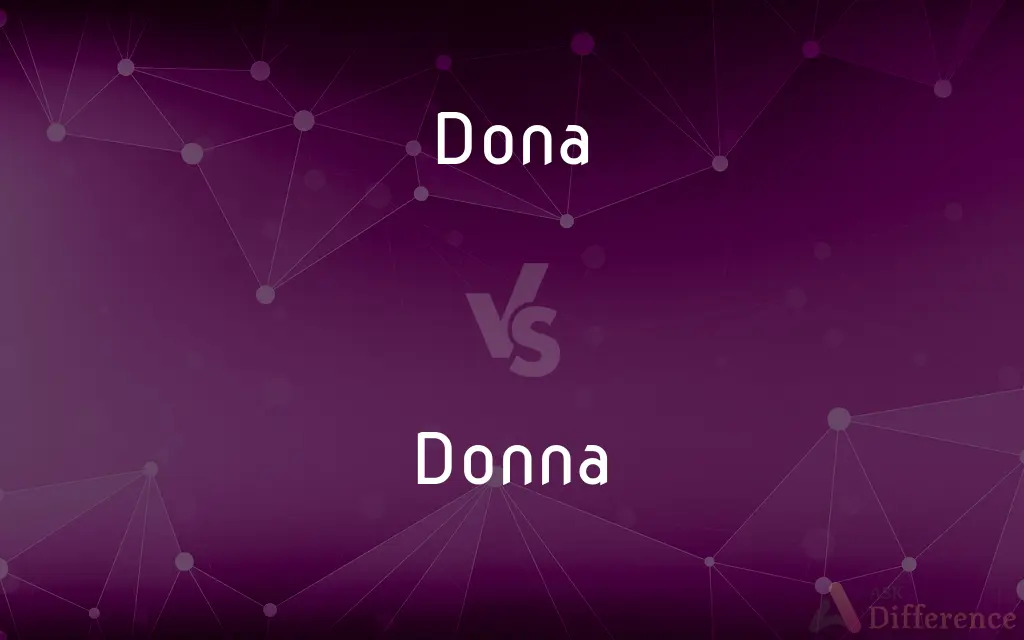Dona vs. Donna — What's the Difference?
By Fiza Rafique & Maham Liaqat — Updated on March 26, 2024
Dona is a title of respect in Spanish-speaking countries, signifying a lady, whereas Donna is an Italian name and title meaning lady or mistress.

Difference Between Dona and Donna
Table of Contents
ADVERTISEMENT
Key Differences
Dona is used in Spanish and Portuguese cultures as a title preceding a woman's first name to denote respect, typically for women of higher social status. This usage emphasizes social hierarchy and respect in these cultures. On the other hand, Donna is primarily an Italian word and given name that translates to "lady" or "mistress" in English, used both as a title and a first name, reflecting status and femininity.
While Dona is rooted in Iberian languages and is deeply intertwined with the cultural norms of respect and honor, Donna in Italian contexts also carries connotations of nobility and respect but has been widely adopted as a personal name beyond Italy, especially in English-speaking countries. This has broadened Donna's implications, making it less formal than its original usage.
Dona's use as a form of address is formal and is less commonly seen as a first name. This distinguishes it from Donna, which has evolved to become a popular first name in several countries, losing some of its formal title connotations outside of Italy.
In terms of linguistic and cultural significance, Dona is specifically tied to Spanish and Portuguese heritage, embodying the linguistic practices and honorific traditions of these societies. Donna, while also originating as a title, has transcended its initial context to become a common name in various cultures, highlighting the fluidity of language and cultural exchange.
The distinction between Dona and Donna also reflects broader cultural differences. Dona is an integral part of a linguistic tradition that places a strong emphasis on formality and respect in social interactions, especially in Latin American countries. Meanwhile, Donna's adoption as a given name in many English-speaking countries signifies a blend of respect for Italian culture and the adaptation of foreign terms into the local lexicon.
ADVERTISEMENT
Comparison Chart
Origin
Spanish/Portuguese
Italian
Meaning
Title of respect
Lady or mistress
Usage
Formal title
Both a title and a first name
Cultural Context
Iberian languages, signifies respect
Italian, widely used in English-speaking countries as a first name
Formality
More formal
Less formal when used as a name
Compare with Definitions
Dona
Used to signify a woman of high social standing.
The event was attended by Dona Elena and other distinguished guests.
Donna
Less formal when used as a personal name.
Donna and I went to school together.
Dona
Not commonly used as a first name.
It's rare to meet someone named Dona in this region.
Donna
An Italian term meaning lady or mistress, used as a title and name.
Donna Margherita received a warm welcome.
Dona
Specific to Spanish and Portuguese cultures.
Dona Teresa's presence at the ceremony honored our traditions.
Donna
Reflects the influence of Italian culture globally.
Naming her daughter Donna was a nod to her Italian heritage.
Dona
Reflects formality and respect in address.
We were introduced to Dona Isabel, the estate owner.
Donna
A common first name in English-speaking countries.
Donna is attending the conference next week.
Dona
A title of respect used before a woman's name in Spanish-speaking regions.
Dona Maria is respected throughout the community.
Donna
Implies nobility or respect when used as a title in Italy.
Donna Sofia, can I have a moment of your time?
Dona
Used as a courtesy title before the name of a woman in a Spanish-speaking area.
Donna
Used as a courtesy title before the name of a woman in an Italian-speaking area.
Dona
Lady; mistress; madam; - a title of respect used in Spain, prefixed to the Christian name of a lady.
Donna
A lady, especially a noblewoman; the title given to a lady in Italy.
Donna
A lady; madam; mistress; - the title given a lady in Italy.
Donna
An Italian woman of rank
Common Curiosities
How do Dona and Donna reflect social status?
Both terms are associated with respect and nobility, but Dona is more formal and directly tied to social hierarchy, whereas Donna, as a name, has broader and less formal implications.
What is the primary use of Dona?
Dona is used as a formal title of respect in Spanish and Portuguese-speaking countries.
What cultural significance does Donna have?
Donna has cultural significance in Italy as a title and has been widely adopted as a female first name in English-speaking countries, reflecting Italian cultural influence.
Is the usage of Dona limited to certain regions?
Yes, the use of Dona as a title of respect is specific to Spanish and Portuguese-speaking regions.
Can men use the titles Dona or Donna?
No, both Dona and Donna are titles and names exclusively used for women.
Is Dona common as a first name?
No, Dona is not commonly used as a first name; it is primarily a title of respect.
How has the meaning of Donna evolved outside Italy?
Outside Italy, Donna has evolved from a title to a widely used first name, losing some of its original formality.
Can Donna be used as a title and a name?
Yes, Donna can be both a title meaning "lady" in Italian and a common first name in English-speaking countries.
How are Dona and Donna perceived in modern contexts?
Dona retains its traditional respect in modern Spanish and Portuguese contexts, while Donna, as a first name, is seen more colloquially.
What factors influence the use of Dona or Donna in a name?
Cultural background, tradition, and personal preference influence the choice between Dona and Donna as part of a name.
What differentiates Dona and Donna in everyday language?
Dona is strictly a title of respect in its cultures, while Donna is versatile, used both as a title and a first name in various contexts.
What is the significance of the title Dona in Spanish culture?
In Spanish culture, Dona signifies formality, respect, and often a higher social status.
Do Dona and Donna have equivalents in other languages?
Yes, many languages have equivalents for titles of respect for women, though the specifics and usage can vary widely.
How do Dona and Donna compare in terms of formality?
Dona maintains a higher level of formality as a title, while Donna is less formal, especially when used as a personal name.
Is Donna a popular name outside of Italy?
Yes, Donna has become a popular first name in various English-speaking countries.
Share Your Discovery

Previous Comparison
Dirge vs. Lament
Next Comparison
Weave vs. WeftAuthor Spotlight
Written by
Fiza RafiqueFiza Rafique is a skilled content writer at AskDifference.com, where she meticulously refines and enhances written pieces. Drawing from her vast editorial expertise, Fiza ensures clarity, accuracy, and precision in every article. Passionate about language, she continually seeks to elevate the quality of content for readers worldwide.
Co-written by
Maham Liaqat













































